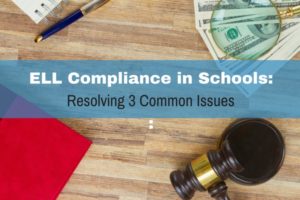Both federal and local laws require school districts to provide translation help for English Language Learners (ELLs) and their families. Schools often struggle with ELL compliance. But they must still work to ensure that these families aren't left behind.
Districts that don't comply leave themselves open to costly lawsuits, and worse, ELLs struggle.
But it doesn't have to be that way. Here are 3 common ELL compliance issues school districts can avoid.
General Access to Translation and Interpretation for ELL Families
Study after study confirms that students are more successful when their families take an active role in their education. But what happens when families, teachers and school officials don't speak the same language?
Without access to translation and interpretation services, ELL families are at a disadvantage. Federal civil rights laws like the Civil Rights Act of 1964 require schools to provide equal opportunities to students without discriminating based on language and national origin.
That means that ELL families are required to have the same access to important information about their children's education and school performance, including parent-teacher conferences, grades, school policies and disciplinary actions, as families who speak English proficiently.
Translation Services for Special Needs Students of ELL Families
In the past few years, several school districts have found themselves the target of lawsuits from groups representing ELL families with special needs children.
Family involvement is important for all children. But it's especially important for special needs families. Most families of special needs children see themselves as advocates. It's their job to work with the school to make sure their children get the best possible education. But they can't do that if they don't understand the services that are available.
It is essential that ELL families with special needs children receive access to interpreters and translated copies of all relevant documents, including individualized education plans. Otherwise, they can't ensure their children get the help they need.
Unfortunately ELL families with special needs are still not getting equal access in some schools. As a result, some districts are expending valuable resources defending themselves in court.
Providing Access to Language Resources to All Eligible Students
It's not enough to have ELL resources. ELL students must also have access to those resources. Refugees and other especially challenging ELL children must not be discouraged from enrolling in schools that offer the language resources they need.
Lack of compliance with laws that protect ELL students is surprisingly common. For example, in its coverage of one recent case, the Boston Globe wrote:
"[S]uch problems probably go well beyond Holyoke, noting that state education officials have faulted more than 100 school systems in recent years for failing to provide these kinds of services after reviewing student files and other documents. "
Being out of compliance comes with a long list of undesirable consequences. There's the possibility of lawsuits, bad publicity and even loss of funding. And ELL compliance can be complicated. Even districts with a history of diversity struggle, and districts without that history struggle even more.
VIA can help. We are a leading provider of education-industry translations. Our translators are native speakers and industry experts. Our convenient online translation portal and efficient project management process will help you translate all of the documents you need to keep ELL families informed and engaged while minimizing the impact on your budget.
Want to learn more about our award-winning translation services for schools and school districts? Contact us.
Achieve ELL Compliance With VIA's Translation Services

